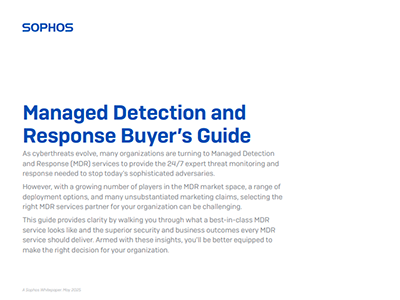$2.73M
Average ransomware recovery cost
Call a Specialist Today! 888-785-4405 | Free Shipping!

Instant PDF download — no login required. A practical guide for leaders who want stronger security, less noise, and better outcomes.

This isn't a fluffy ebook — it's a data-driven buyer's guide packed with benchmarks, expert insights, visuals, and real-world attack findings.
Average ransomware recovery cost
Of attacks happen outside business hours
Of attacks now use remote ransomware

Cyberthreats are evolving faster than most teams can keep up. Attackers increasingly "log in instead of break in," and overworked IT teams struggle to maintain 24/7 vigilance — especially nights, weekends, and holidays.
This buyer's guide cuts through vendor jargon to help you understand what best-in-class MDR looks like, which capabilities matter most, and exactly what questions to ask providers before making your decision.
Download Free Guide17 pages of insights, benchmarks & vendor questions to help you choose the right MDR provider.
Sophos MDR secures 30,000+ organizations worldwide with 500+ threat experts across 7 global SOCs. Here's what best-in-class looks like:
Total incident response time — industry-crushing speed
Insurance claim amounts for MDR customers
Organizations trust Sophos MDR worldwide
In alert fatigue and analyst burnout
See how Sophos MDR drives 38-minute response times through an integrated detection and response workflow.

The end-to-end MDR pipeline that drives 38-minute response times.
Recognized by: Gartner | IDC | MITRE ATT&CK | G2
"The pen testers were shocked they couldn't find a way in."
"We've freed up significant operational hours..."
"Sophos saves us the expense of recruiting up to five new employees."
You're juggling limited resources, constant alerts, siloed tools, and unclear signals. The result? More stress, more risk, and too much time spent firefighting.

Instead of drowning in vendor jargon, you'll get clarity on what matters most:
What a modern, best-in-class MDR service actually looks like — from 24/7 human-led threat response to full-scale incident containment.
Which capabilities matter most when choosing a provider (and which features are just marketing noise).
How MDR strengthens your defenses, reduces risk, increases IT efficiency, and even improves cyber-insurance outcomes.
What questions to ask vendors so you make a confident, informed decision that fits your team, tech stack, and business goals.
This guide is about empowering you: your strategy, your time, your outcomes.
Because you deserve clarity — and a partner that meets you where you are.
How MDR stops threats your tools alone can't catch, including human-led attacks and credential-based intrusions.
What best-in-class detection and response performance looks like, using real benchmarks (like the 38-minute total incident response time noted in the guide).
How to get more value from your current security investments with integrations that reduce noise and deliver richer visibility.
How MDR can improve your team's day-to-day reality, freeing them from manual investigations and alert overload.
How MDR enhances your cyber-insurance position, often lowering premiums by reducing your risk profile.
If you want stronger security without adding headcount, this guide is your starting point.
Deepen your protection journey with solutions that complement MDR
24/7 human-led detection and response that stops active threats before they disrupt your business. Includes full-scale incident response and a $1M breach protection warranty.
Learn MoreExtended detection and response powered by rich telemetry across endpoints, identity, email, firewall, and cloud. Supports both Sophos-native and third-party integrations.
Learn MoreIndustry-leading protection recognized in Gartner's Magic Quadrant and multiple MITRE ATT&CK evaluations. A strong foundation for any MDR deployment.
Learn MoreAdvanced protection for servers with XDR integration. Defend critical infrastructure against ransomware, zero-days, and targeted attacks.
Learn MoreInstant PDF download. No waiting, no obligation. Less noise, better outcomes, stronger protection.
Get the Free MDR Guide